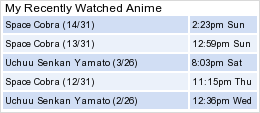the_wolfs_howl (post: 1368833) wrote:Finished An Unauthorized Autobiography: The Unfortunate Life of Lemony Snicket. Lovely, weird book. I shall miss Lemony Snicket.
I read
The Bad Beginning a while ago, but I was more interested in the Harry Potter series, which I started at about the same time. At your recommendation, however, I picked up books 1-5 from my library. I must say, at the beginning, I was disappointed because it seemed to be rather episodic- Violet, Klaus, and Sunny get dropped off with a relative, they live in relative peace for a while, and then Count Olaf appears. The orphans try to tell the adults, but no-one will listen, and they defeat him on their own, only to have him escape. The pattern continued for the first three books, and I was wondering where the mystery was, but then I read the fourth book, I believe, and there was an
Oh! moment where I realized that maybe there was more to the series than I had originally thought. I just finished book 7 a couple of hours ago and am very interested in the adventures of the Baudelaires.
However, I can't start on book the eighth until I finish
The Apology by Plato. It is rather refreshing to read the straightforward speaking style after reading
On Happiness by Aristotle. I am reading the essays for a class that I am taking and enjoying very, very, much. I also finished
Rothschild's Fiddle by Anton Chekov for the same class a while ago and found it alright, but not the greatest until I went to class and discussed it. It is amazing how much more you can get out of a book when you discuss it with others.
And sadly, I am also reading a great bit of poetry from Blake, Wordsworth, Shelley, and Keats for another class. I've never been extremely interested in poetry, and these poets were seriously emo. I did enjoy some of the poetry from each poet, however, but I enjoy reading about the poet's life more than his work more. For that class, I've also started
A Christmas Carol which I've gotten a few pages into tonight. I think I will like it, there is something appealing about the writing style.
So yeah, lots of reading, but I must confess I love it.









 About Hans Christian Anderson, I've always been leery of reading his fairy tales because they're so sad!
About Hans Christian Anderson, I've always been leery of reading his fairy tales because they're so sad!  The only ones I've read in their original form are The Little Mermaid and The Red Shoes. Tear-jerking fairy tales, who'd have thought?
The only ones I've read in their original form are The Little Mermaid and The Red Shoes. Tear-jerking fairy tales, who'd have thought?

